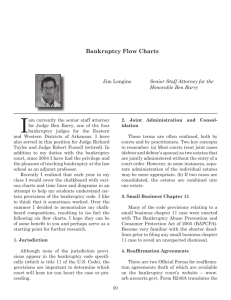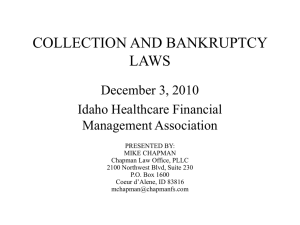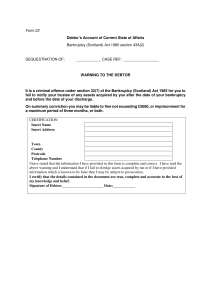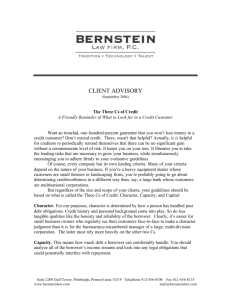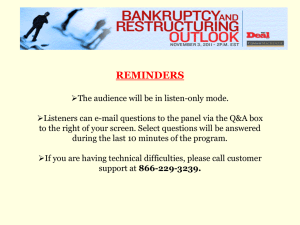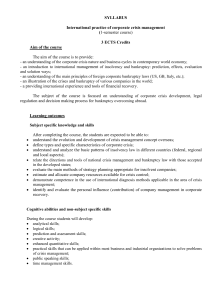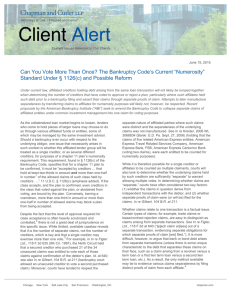Disclosures under the new Bankruptcy Law (2005)
advertisement
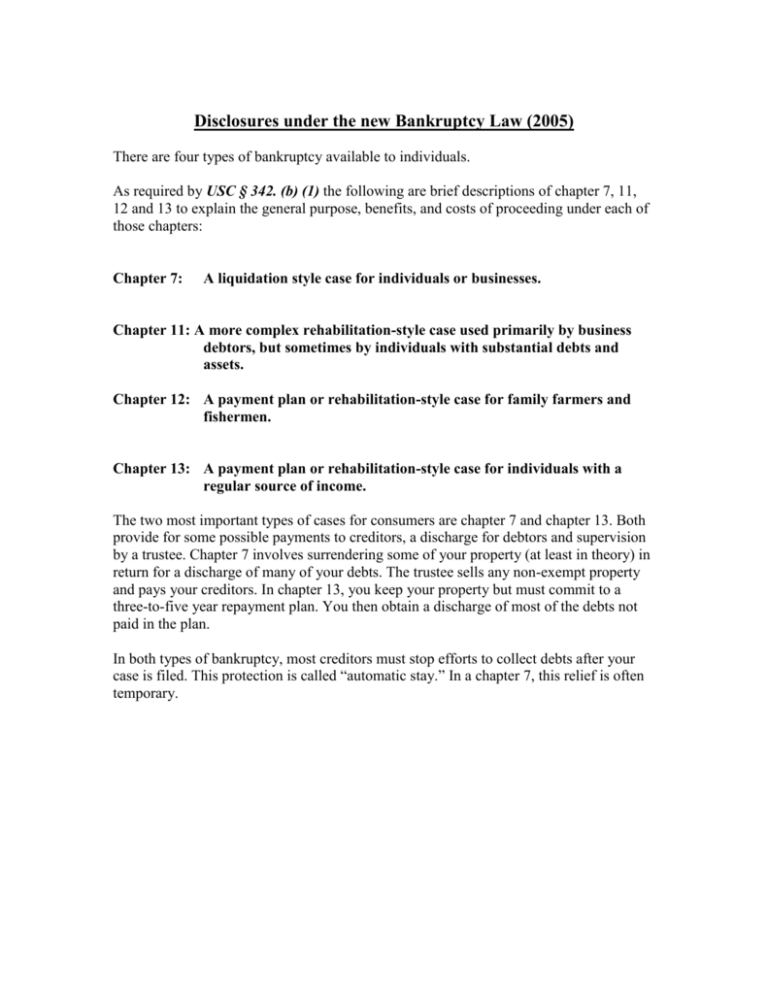
Disclosures under the new Bankruptcy Law (2005) There are four types of bankruptcy available to individuals. As required by USC § 342. (b) (1) the following are brief descriptions of chapter 7, 11, 12 and 13 to explain the general purpose, benefits, and costs of proceeding under each of those chapters: Chapter 7: A liquidation style case for individuals or businesses. Chapter 11: A more complex rehabilitation-style case used primarily by business debtors, but sometimes by individuals with substantial debts and assets. Chapter 12: A payment plan or rehabilitation-style case for family farmers and fishermen. Chapter 13: A payment plan or rehabilitation-style case for individuals with a regular source of income. The two most important types of cases for consumers are chapter 7 and chapter 13. Both provide for some possible payments to creditors, a discharge for debtors and supervision by a trustee. Chapter 7 involves surrendering some of your property (at least in theory) in return for a discharge of many of your debts. The trustee sells any non-exempt property and pays your creditors. In chapter 13, you keep your property but must commit to a three-to-five year repayment plan. You then obtain a discharge of most of the debts not paid in the plan. In both types of bankruptcy, most creditors must stop efforts to collect debts after your case is filed. This protection is called “automatic stay.” In a chapter 7, this relief is often temporary. Also available to you are several services from the following credit counseling agencies: FLM Middle District of Florida Consumer Credit Counseling Service of Central Florida and the Florida Gulf Coast, Inc. 3670 Maguire Blvd. Suite 103 Orlando, Fl 32803 800-741-7040 www.payoffdebt.org In Person, Telephonic, and Internet Consumer Credit Counseling Service of Greater Atlanta Inc. 100 Edgewood Avenue Suite 1800 Atlanta, GA 30303 800-251-2227 www.cccsinc.org In Person (not available in all judicial districts), Telephonic and Internet Consumer Credit Counseling Service of Mid-Florida, Inc. 1539 NE 22nd Avenue Ocala, FL 34478 800-245-1865 In Person and Telephonic Credit Counseling Centers of America 9330 LBJ Freeway Suite 900 Dallas, TX 75379-8039 800-493-2222 www.cccamerica.org In Person (not available in all judicial districts), Telephonic and Internet GreenPath, Inc. 38505 Country Club Drive, Suite 210 Farmington Hills, MI 48331-3429 800-630-6718 www.greenpath.com In Person (not available in all judicial districts), and Telephonic Money Management International Inc. 9009 West Loop South 7th Floor Houston, TX 77096-1719 877-918-2227 www.moneymanagement.org Hummingbird Credit Counseling and Education 3737 Glenwood Avenue, Suite 100 Raleigh, NC 27612 tel: 1-800-645-4959 email: help@hbcce.org http://www.hummingbird.org/ For additional sites, see http://www.usdoj.gov/ust/index.htm 2 USC § 527. Disclosures (A) All information that you are required to provide with your petition and thereafter during a case under this title is required to be complete, accurate, and truthful. (B) All assets and all liabilities are required to be completely and accurately disclosed in order to commence the case. (C) Current monthly incomes, (disposable incomes for chapter 13 cases) are to be accurately stated and specified. (D) Information that you provide during your case may be audited, and failure to provide accurate and complete information may result in the dismissal of your case under this title or any other sanction, including criminal sanction. Under 11 U.S.C § 342 (2) (a) A person who knowingly and fraudulently conceals assets or makes a false oath or statement under penalty of perjury in connection with a case under this title shall be subject to fine, imprisonment, or both; and (b) All information supplied by a debtor in connection with a case under this title is subject to examination by the Attorney General. We are required to maintain these records under USC § 527 (a) for two (2) years after the date on which you disclose this information. The undersigned acknowledges receipt of this disclosure required by 11 U.S.C. § 527(a). I/WE have read and understand its contents and the implications associated with failing to honestly provide information about our income, expenses, property and other financial circumstances. ___________________ Name ___________________ Date ___________________ Name ___________________ Date 3 IMPORTANT INFORMATION ABOUT BANKRUPTCY ASSISTANCE SERVICES FROM AN ATTORNEY OR BANKRUPTCY PETITION PREPARER If you decide to seek bankruptcy relief, you can represent yourself, you can hire an attorney to represent you, or you can get help in some localities from a bankruptcy petition preparer who is not an attorney. THE LAW REQUIRES AN ATTORNEY OR BANKRUPTCY PETITION PREPARER TO GIVE YOU A WRITTEN CONTRACT SPECIFYING WHAT THE ATTORNEY OR BANKRUPTCY PETITION PREPARER WILL DO FOR YOU AND HOW MUCH IT WILL COST. Ask to see the contract before you hire anyone. The following information helps you understand what must be done in a routine bankruptcy case to help you evaluate how much service you need. Although bankruptcy can be complex, many cases are routine. Before filing a bankruptcy case, either you or your attorney should analyze your eligibility for different forms of debt relief available under the Bankruptcy Code and which form of relief is most likely to be beneficial for you. Be sure you understand the relief you can obtain and its limitations. To file a bankruptcy case, documents called a Petition, Schedules and Statement of Financial Affairs, as well as in some cases a Statement of Intention need to be prepared correctly and filed with the bankruptcy court. You will have to pay a filing fee to the bankruptcy court. Once your case starts, you will have to attend the required first meeting of creditors, where you may be questioned by a court official called a ‘trustee’ or by creditors. If you choose to file a chapter 7 case, you may be asked by a creditor to reaffirm a debt. You may want help deciding whether to do so. A creditor is not permitted to coerce you into reaffirming your debts. If you choose to file a chapter 13 case in which you repay your creditors what you can afford over 3 to 5 years, you may also want help with preparing your chapter 13 plan and with the confirmation hearing on your plan which will be before a bankruptcy judge. If you select another type of relief under the Bankruptcy Code other than chapter 7 or chapter 13, you will want to find out what should be done from someone familiar with that type of relief. Your bankruptcy case may also involve litigation. You are generally permitted to represent yourself in litigation in bankruptcy court, but only attorneys, not bankruptcy petition preparers, can give you legal advice. Please find below information to assist you in the accurate completion of your petition: (1) (a) How to value assets at replacement value: you may hire an appraisal or visit a used furniture store or in valuing automobiles, see a used car dealer, or check with various internet sites, such as Kelley Blue Book or NADA for such value. 4 If the debtor is an individual in a case under chapter 7 or 13, such value with respect to personal property securing an allowed claim shall be determined based on the replacement value of such property as of the date of the filing of the petition without deduction for costs of sale or marketing. With respect to property acquired for personal, family, or household purposes, replacement value shall mean the price a retail merchant would charge for property of that kind considering the age and condition of the property at the time value is determined. (b) How to determine current monthly income, the amounts specified in § 707 (b): please provide six months of pay stubs, a tax return for the last year filed and W2(s) for the last year (c) In a chapter 13 case, how to determine disposable income in accordance with § 707 (b) (2) and related calculations: same as 1(b) (2) (a) How to complete the list of creditors, including how to determine what amount is owed and what address for the creditor should be shown: you have the option of pulling a credit report from a credit reporting agency or for a fee; my office will pull your credit report from either two or three credit reporting agencies. It is imperative that each creditor is listed on your schedules, including secured creditors that you wish to continue paying. Secondly, each creditor must contain an address, city, state and zip code. Please check your invoices or billing statements for the address for each creditor. Often times creditors have several addresses, you should list the address the creditor receives correspondence. Some creditors may list an address for bankruptcy notices to be sent; if so, please list that address as well. If a creditor has turned your account over to a collection agency or attorney, please list the original creditor’s address and the collection agency and attorney address. These addresses are necessary so all parties for a creditor gets notice of the bankruptcy filing. (3) (b) How to determine what property is exempt and how to value exempt property at replacement value as defined in § 506. Florida has “opted out” of the Federal exemptions and Florida residents are allowed state and local law exemptions, other federal law exemptions, and exemptions listed in Florida Statute Chapter 222 and for a partial list of federal statutory exemptions (other than those listed in the Bankruptcy Code); 11 U.S.C. (b)(2)(A). Can I keep my home? Florida law allows a debtor to exempt their homestead and keep it free from the creditors, provided it is a personal residence plus 160 contiguous acres if located outside a municipality or a personal residence plus ½ acre within a municipality. However, the value of the homestead that will be allowed as exempt under state law must be reduced to the extent of any addition to the value of the homestead on 5 account of a disposition of non exempt property made by the debtor made with intent to hinder, delay, or defraud creditors during the 10 years prior to the bankruptcy filing. However, to the extent the debtor could have exempted the converted property; the debtor may still claim that portion of the homestead as exempt. Secondly, a debtor my not exempt any amount of homestead property in excess of *$136,875.00 which was acquired during the past 40 months preceding the bankruptcy filing. The value of the homestead derived from any money put into the recently acquired house in excess of *$136,865.00 will not be exempt in the debtor’s bankruptcy. The only exception to the *$136.875.00 cap is for money derived from the sale of a prior homestead within the state of Florida. Can I keep my car? Florida law allows you to have a $1000.00 equity exemption in an automobile. For instance, if your automobile is valued at $1000.00, you can keep it. Sometimes, a joint debtors, husband and wife, can combine their exemptions together in one automobile. For instance, joint debtors can have a $2,000.00 exemption in one automobile provided it is jointly titled. What happens if I have more than $1000.00 equity in my automobile? In a chapter 7, the trustee can liquidate your automobile. That means, the trustee can take it from you and sell it. How much personal property is exempt? Personal property up to $1,000.00 is exempt; husband and wife can each claim $1,000.00 in personal property if they are filing a joint petition. If you do not claim a homestead exemption, your personal property exemption is an additional $5,000.00 per debtor (husband and wife). Personal property includes cash, money in the bank, clothing, household goods and furnishings stocks and other items. Is my IRA exempt? Yes, retirement or profit sharing plan income including IRA’s qualified under IRC S408 is exempt * Amounts are subject to adjustment on 4/1/10 and every 3 years thereafter with respect to cases commenced on or after the date of commencement. 6

